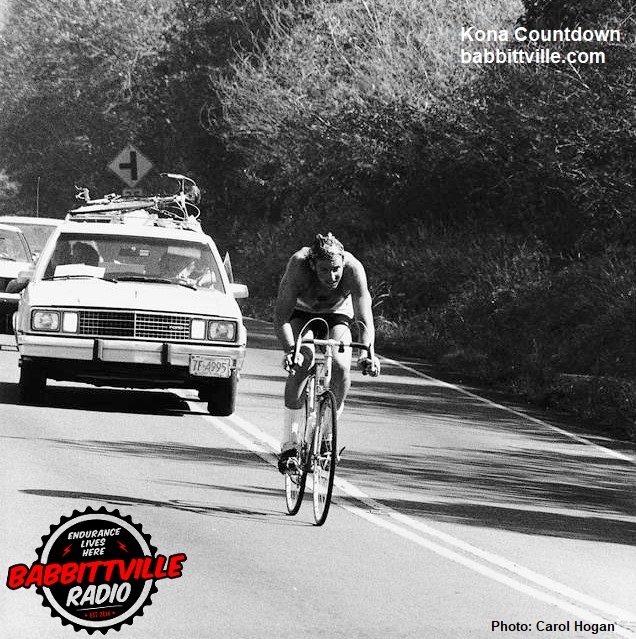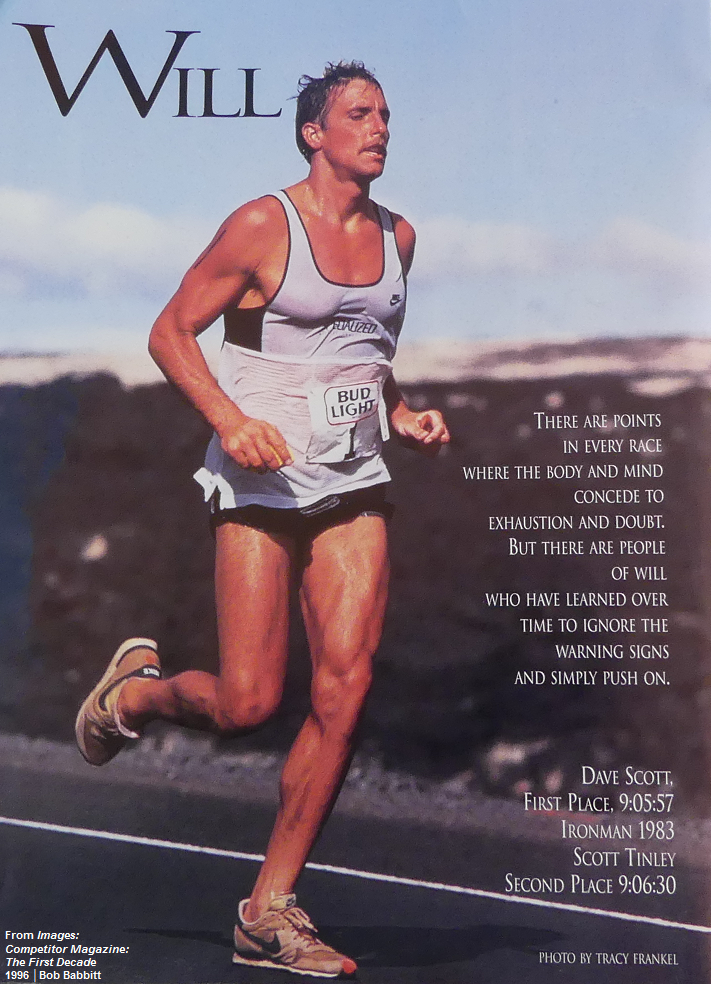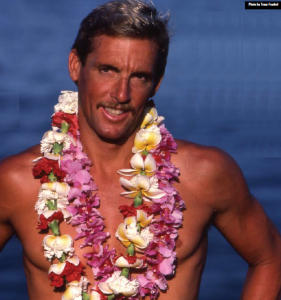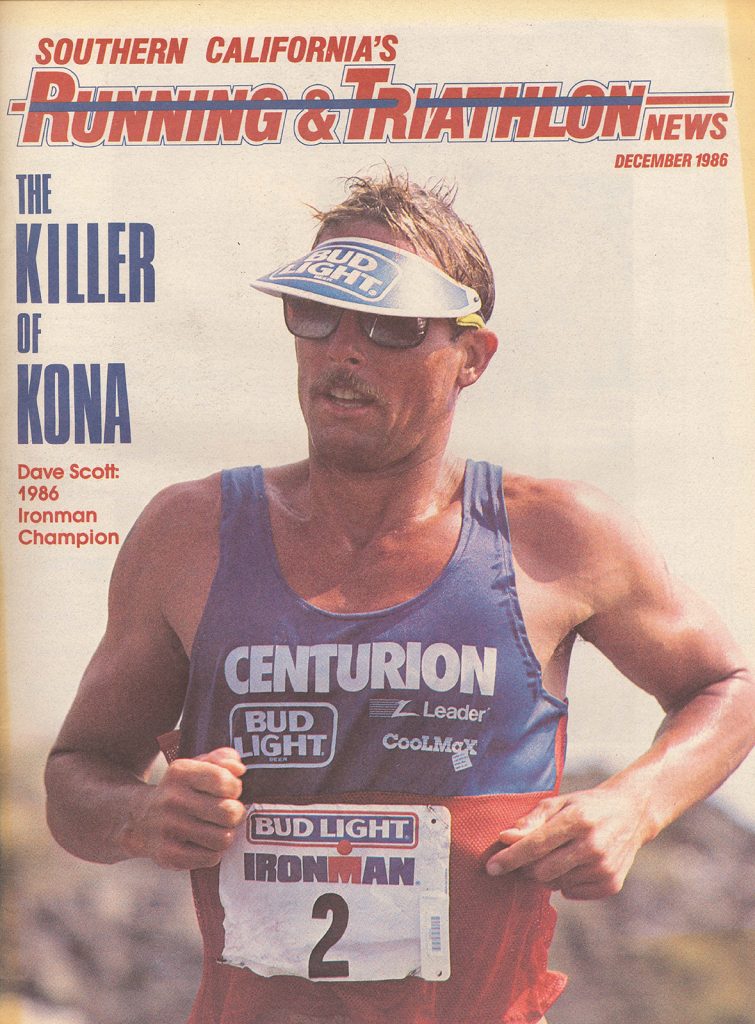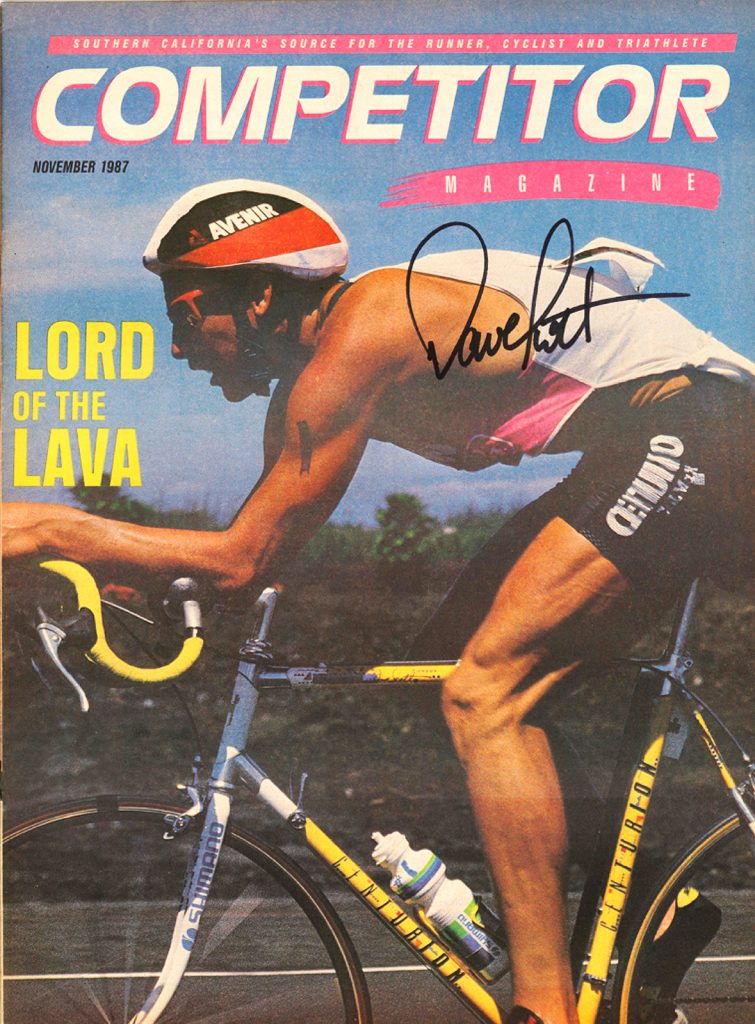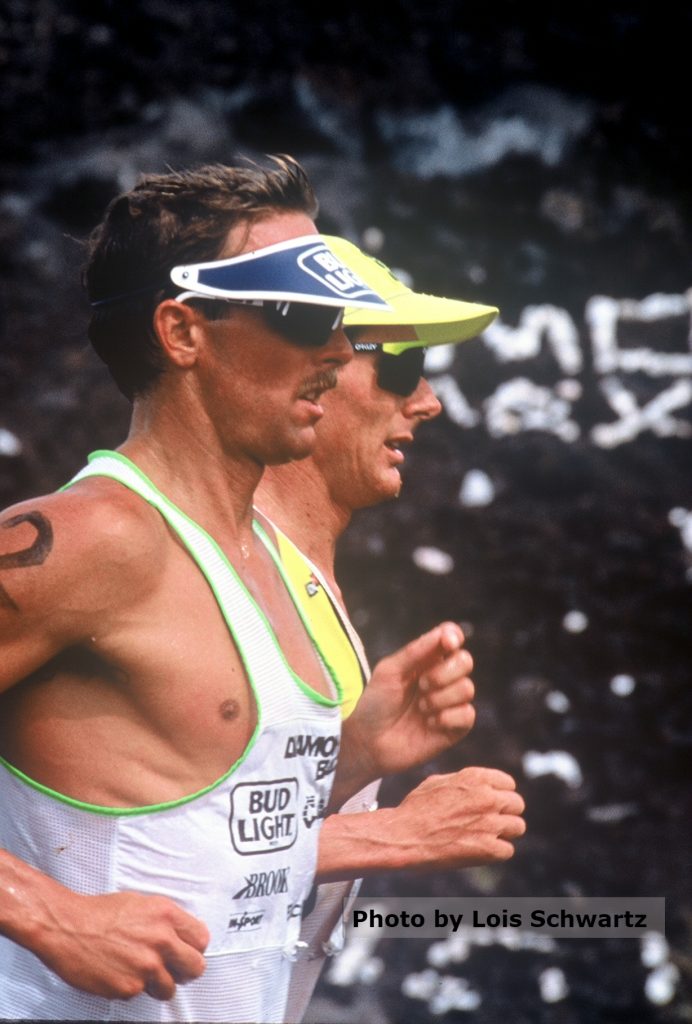Leading into the 1994 Ironman World Championship, there were rumors that 6-time champion, Dave Scott might be racing again. Reflecting on the buzz he was generating, I wrote about the Dave Scott mystique for Competitor Magazine: Still Lord of the Lava.
You’re standing at a trade show. Any trade show. It could be a sporting goods show, a bike show – even the Wallabee Springs Fish & Tackle Show.
You’re the guy with the chiseled looks and the two first names. You saunter over to the booth, choose your weapon (maybe a silver marking pen or a black Magic Marker) and get ready for the onslaught. Even at a show where the average person has barely heard of your sport, they know your name. You’re Dave Scott.
The line of people waiting for an autograph seems to stretch forever. And it lasts forever, too, because you’re not the keep-your-head-down-and-see-how-many-posters-I-can-sign-in-an-hour type. Nope. You’re Dave Scott. And Dave Scott doesn’t make small talk. You’re the Phil and Oprah of the signing set. You find out about each person’s training, their family, their job. You drive the booth operators to distraction.
“Dave, the line is around the block,” they say. “Dave, can we get this going?” “Dave, my clothes are going out of style.” “Dave, I have three kids and I’d like to get home before they go away to college.”
“Dave!!!!!”
Getting it going is not your style. Being a class act is.
“It was about a month after my accident,” remembers David Bailey, a former motocross champion who now stars on the wheelchair racing circuit. A fan of his named Rick Sutton visited Bailey in the hospital and the two got to talking about you. They’re both big admirers. “Sutton called Dave to see if he could visit me in the hospital,” Bailey recalls. You were out of town, so Sutton left a message. “When Dave called him back, Rick nearly fell over,” remembers Bailey. You drove four hours through a horrible rainstorm to visit Bailey, managing to find the place despite confusing directions.
“I remember Dave walking into my room,” smiles Bailey. “It was like sunshine. He looked so healthy, and he had this big smile. I’m thinking, ‘What am I going to say to Dave Scott?’ It wasn’t more than a minute and I was at ease. I can’t even tell you what we talked about. Just seeing him was enough. What I do remember is that he stayed for a long time. And there was this special feeling … I could see it in his eyes. It was like he wanted to get me up and out of there all by himself.”
It’s funny. If you look at your overall race record over the past 13 years (Yep, that’s right. You won your first lronman way back in the winter of 1980), there are no 20-0 winning streaks stretched over two years like Mark Allen has. No Coke Red Jerseys like Mike Pigg or Scott Molina. No Triathlete of the Year awards. Your career has revolved around one day a year, one race. Sort of like Reggie Jackson coming alive in the World Series or Joe Montana winning the Super Bowl. Coming up big when everything is on the line, when everyone is watching. That’s Dave Scott.
“David was an All Star in baseball,” remembers Dorothy Scott, his proud mom. As a water polo star, you turned to be the first AII-American in any sport from Davis High. “He played football during his sophomore and junior years,” continues Dorothy Scott. “Davis didn’t offer water polo until his junior year. The football coach was very upset when David quit the team to play water polo.”
At UC Davis, you were known as a workout-aholic, the guy who led the water polo team by example. “We’d work out three times a day for two to three weeks before school started,” remembers a former teammate, Dr. Mark Roberts of San Diego. “The water polo team would swim in the morning, drill at noon and then scrimmage at night. We were going hard six hours a day. In between workouts, Dave was in the weight room lifting.” During your senior year you were the team captain, and the coach put you in charge of conditioning. “He’d out-lift all the football players,” continues Roberts. In 1976, before the Olympics, the UC Davis team scrimmaged the Olympic team. UC Davis was ranked fifth in the nation that year and you were an All American. “The national team killed us,” recalls Roberts, “but Dave could play with those guys. He was that good.”
“As a player, Dave wasn’t mean – just very intense about everything. He never wanted to lose. He was very strong, very physical. Not dirty. Physical. Triathlon turned out to be the perfect sport for him, because he trained more than anybody.”
Following your lead, three of your former water polo teammates have finished in the top 100 at the lronman.
In 1980, the first time the lronman aired nationally, you were a young swim coach from Davis with a penchant for hard work and success. You ran away with the lronman title in 1980, breaking Tom Warren’s course record by nearly two hours. Your parents, Verne and Dorothy, followed closely in a rental car with a spare bike strapped on the roof – just in case.
“Verne was in Egypt on business,” remembers Dorothy. “From there he flew to Sydney, Australia to watch our daughter Jane play water polo for the national team. I met him there.”
After the American team won the world title, the two flew off to Hawaii to see their first triathlon. “At the time, Verne and I both had trouble just pronouncing the word triathlon. We didn’t know very much about it. As we watched David being filmed for television, I kept saying to Verne, ‘I can’t believe this is happening to our son!” That night, after you won the race, the Scotts tried to find a place to eat dinner in Honolulu. “I had talked to a writer who recommended Ben’s Fish Market,” says Dorothy. “I called for a reservation, but they said they didn’t have anything until 10 or 11 that evening. I said, ‘Would it help any if I told you my son won the lronman Triathlon today?’
There was a pause and then he said, ‘What time would you like to come in, Mrs. Scott?”
You’ve raced the Ironman eight times. You won six. Your only losses were to Scott Tinley in 1982 and Mark Allen in 1989. But you didn’t just win. Part of the Dave Scott mystique is the way you won, the way you came back. In 1983, you beat Scott Tinley by just 33 seconds. In 1984 you were 13 minutes off the pace at the end of the bike and went on to run Mark Allen down. In 1987 you came back from five minutes back to catch Mark Allen again.
Journalist Mike Plant says that the 1984 Ironman was where the Dave Scott legend really began. It sure made for good drama, good television. You storming out of transition, 13 minutes down, furious, teeth clenched, singlet on backwards looking for all intents and purposes like you were ready to kill someone.
Every year, millions tuned in to watch you pull another one out of the fire. You were never the pre-race favorite – just a sentimental one.
Three women – big Dave Scott fans – spent most of lronweek 1986 trying to run into you at your hotel in Kona. “We’d go by his hotel every morning, just hoping to catch a glimpse of him,” one of the women confesses. “We ran into him twice, said hello and ran off. On race day, we set ourselves on the first hill out of town. Here comes Dave up the hill and we’re screaming for him. He just looks over like we’re his best friends and gives us this wink, this don’t-worry-about-it-girls, everything-is-under-control wink.”
Mark Allen was undoubtedly the faster runner and cyclist for a number of those years. But that was in other places … at other races. The lava fields of the Big Island usually proved to be the equalizer. Athletes who pummeled you during the season melted in Hawaii. You were “The Man,” “Mr. October,” “The Lord of the Lava” and ‘The Kona Kid.”
Your stamp was on the race – you were the one to beat. Nobody talked about racing their own race at the Ironman. They raced your race and hoped they could somehow do it better than you. In 1987, Mark Allen made the mistake of leaving your side too soon, taking off early in the marathon after shadowing you throughout the bike ride. When he crumbled, you passed him to win your sixth Ironman.
“There’s one thing you can count on when you’re out there, “Allen said before the 1989 lronman, “and that’s that Dave Scott is not going to die. Which means that, when it gets tough for me, I’m going to go beyond that one or two or three or 10 steps until I get to the point where the guy is behind me.”
Any other race, any other day, Mark Allen doesn’t even think about the other guy. In Hawaii, on your turf, he has to. And that’s because you’ve not only set the rules, you’ve set – and predicted – the standards. You were the first one to go under 11 hours, the first under 10, the first under nine and the first under eight and a half. In 1986 you spoke of a close to eight-hour lronman. ‘There’s a lot of time that can be lopped off the Ironman run,” you said. “I think someone could run in the low 2:40’s. I know I could run a 2:41 there.”
And you did. In 1989, you did everything you said you were going to do, but still lost to Mark Allen. The best lronman race ever.
But the loss didn’t change the way people feel about you. A store called Tri Sport opened in La Jolla, California that year. They had a sign on the door: “Closed Sundays, Holidays, and Dave Scott’s Birthday,”
When you made an appearance there, the line of people waiting to see you wound around the block. One guy was there three hours early. Why? “There are only three people I’d wait to see,” he said. “My mom, God … and Dave Scott.”
It happens in every sport. The baseball players of our youth turn 40 and become businessmen before we know it. Still, we remember them always as 24, when they went deep into the hole between third and short and made that big play. For some reason, keeping our heroes young seems to keep us young as well.
Mark had just won the 1991 Nice Triathlon, the press is interviewing him, and they announce that Wolfgang Dittrich and Dave Scott were heading toward the finish. Everyone turned to look as Dave finished stride for stride with Wolfgang, in 5th place. Dave came off the bike in about 20th place. One minute Mark was smiling, talking to friends and family. When he heard the announcer, he turned his head to watch the finish. When he turned back, his face was blank. Mark looked sort of puzzled, like, ‘Is he really right there next to Wolfgang? Did he really run 20 miles that fast?’
The sport of triathlon is nearing its 20th year. Our first generation of heroes – you, Mark Allen, Scott Molina, and Scott Tinley – is starting to slow down just a bit. You haven’t been back to lronman since 1989, plagued with knee pain and a mysterious inner ear problem. And being a daddy of two doesn’t leave much time to work out. Still, people are noticing that you’re back to training five hours a day in Boulder. That doesn’t sound much like retirement.
There were rumors that you might be racing the Ironman again this October. David Bailey heard them and called the Competitor office. “Is Dave racing?” asks Bailey excitedly. “Probably not,” I reply. “Man, I stare at his poster every single morning,” he went on. “lf he IS racing, I’m there. I don’t care what it takes. I’ll swim over to Kona and sleep on the ground.”
You’re 39 now, but you have a long history of surprising people. Dave Scott on the 1994 Gatorade Ironman starting line at the age of 40? We’re not about to make any predictions. David Bailey might be doing some swimming. You just might surprise us all again.
Prologue: Dave Scott came back in 1994 to race the Ironman World Championship where he once again set the standard, finishing in 2nd place at age 40, showing that he was still….Lord of the Lava.
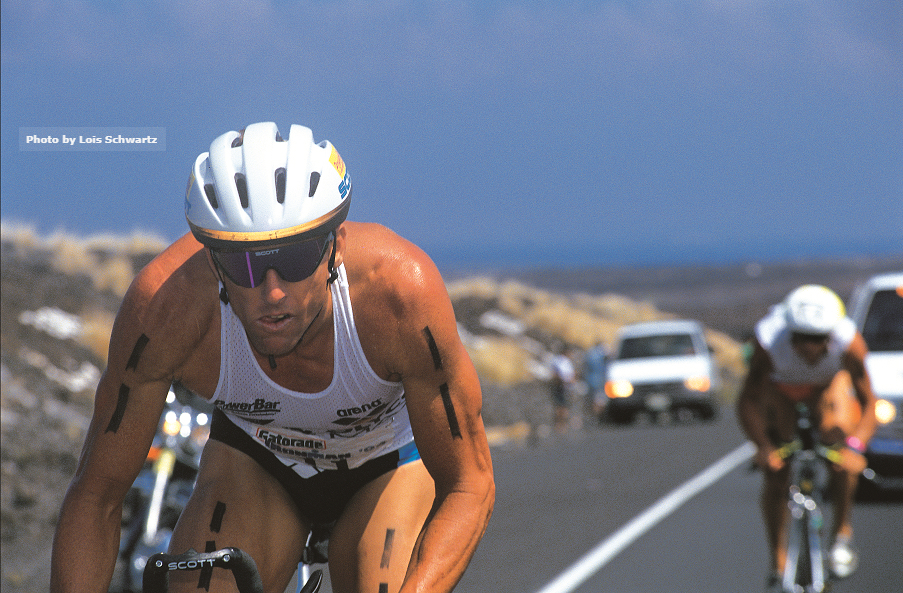
Dave Scott rides ahead of eventual winner Greg Welch at the 1994 Ironman World Championship. Photo by Lois Schwartz
In 2015, Dave Scott joined me on Breakfast with Bob during Ironman week to talk about his 1994 race…
You may also like: Talk Story: The Signature Style of Dave Scott


